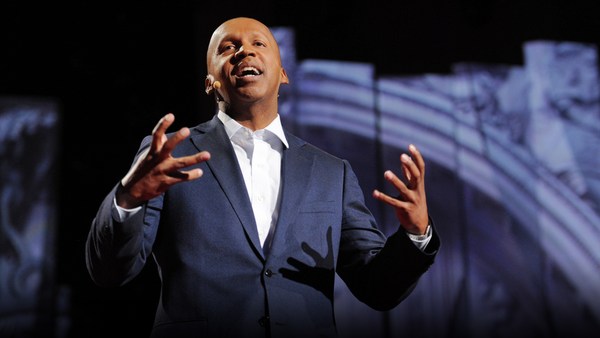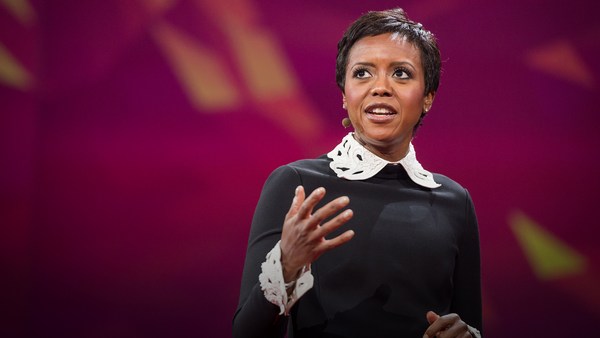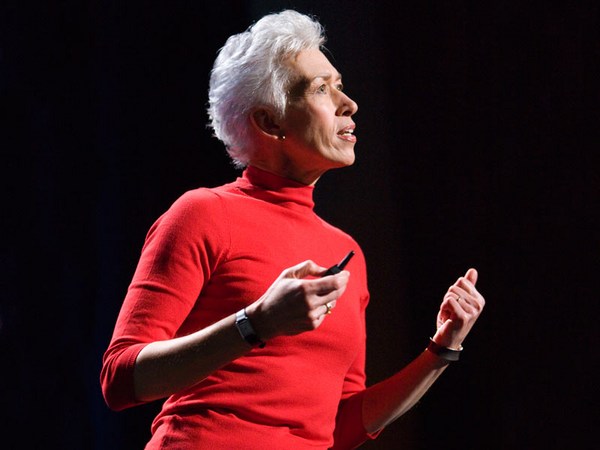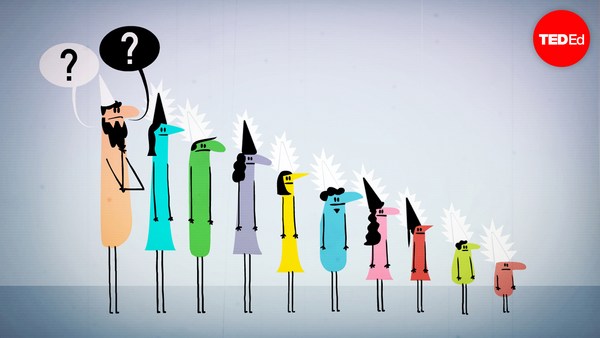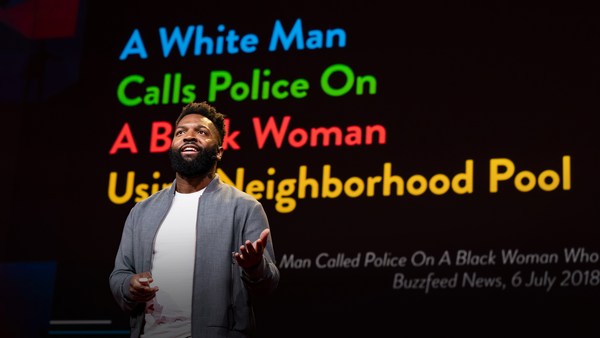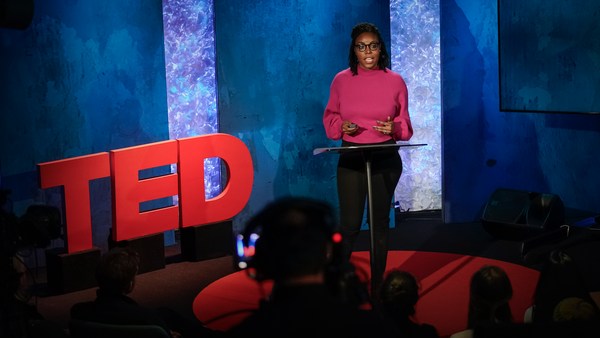I was on a long road trip this summer, and I was having a wonderful time listening to the amazing Isabel Wilkerson's "The Warmth of Other Suns." It documents six million black folks fleeing the South from 1915 to 1970 looking for a respite from all the brutality and trying to get to a better opportunity up North, and it was filled with stories of the resilience and the brilliance of African-Americans, and it was also really hard to hear all the stories of the horrors and the humility, and all the humiliations. It was especially hard to hear about the beatings and the burnings and the lynchings of black men. And I said, "You know, this is a little deep. I need a break. I'm going to turn on the radio." I turned it on, and there it was: Ferguson, Missouri, Michael Brown, 18-year-old black man, unarmed, shot by a white police officer, laid on the ground dead, blood running for four hours while his grandmother and little children and his neighbors watched in horror, and I thought, here it is again. This violence, this brutality against black men has been going on for centuries. I mean, it's the same story. It's just different names. It could have been Amadou Diallo. It could have been Sean Bell. It could have been Oscar Grant. It could have been Trayvon Martin.
This violence, this brutality, is really something that's part of our national psyche. It's part of our collective history. What are we going to do about it? You know that part of us that still crosses the street, locks the doors, clutches the purses, when we see young black men? That part.
I mean, I know we're not shooting people down in the street, but I'm saying that the same stereotypes and prejudices that fuel those kinds of tragic incidents are in us. We've been schooled in them as well. I believe that we can stop these types of incidents, these Fergusons from happening, by looking within and being willing to change ourselves.
So I have a call to action for you. There are three things that I want to offer us today to think about as ways to stop Ferguson from happening again; three things that I think will help us reform our images of young black men; three things that I'm hoping will not only protect them but will open the world so that they can thrive. Can you imagine that? Can you imagine our country embracing young black men, seeing them as part of our future, giving them that kind of openness, that kind of grace we give to people we love? How much better would our lives be? How much better would our country be?
Let me just start with number one. We gotta get out of denial. Stop trying to be good people. We need real people. You know, I do a lot of diversity work, and people will come up to me at the beginning of the workshop. They're like, "Oh, Ms. Diversity Lady, we're so glad you're here" -- (Laughter) -- "but we don't have a biased bone in our body." And I'm like, "Really? Because I do this work every day, and I see all my biases."
I mean, not too long ago, I was on a plane and I heard the voice of a woman pilot coming over the P.A. system, and I was just so excited, so thrilled. I was like, "Yes, women, we are rocking it. We are now in the stratosphere." It was all good, and then it started getting turbulent and bumpy, and I was like, "I hope she can drive." (Laughter) I know. Right. But it's not even like I knew that was a bias until I was coming back on the other leg and there's always a guy driving and it's often turbulent and bumpy, and I've never questioned the confidence of the male driver. The pilot is good. Now, here's the problem. If you ask me explicitly, I would say, "Female pilot: awesome." But it appears that when things get funky and a little troublesome, a little risky, I lean on a bias that I didn't even know that I had. You know, fast-moving planes in the sky, I want a guy. That's my default. Men are my default. Who is your default? Who do you trust? Who are you afraid of? Who do you implicitly feel connected to? Who do you run away from?
I'm going to tell you what we have learned. The implicit association test, which measures unconscious bias, you can go online and take it. Five million people have taken it. Turns out, our default is white. We like white people. We prefer white. What do I mean by that? When people are shown images of black men and white men, we are more quickly able to associate that picture with a positive word, that white person with a positive word, than we are when we are trying to associate positive with a black face, and vice versa. When we see a black face, it is easier for us to connect black with negative than it is white with negative. Seventy percent of white people taking that test prefer white. Fifty percent of black people taking that test prefer white. You see, we were all outside when the contamination came down.
What do we do about the fact that our brain automatically associates? You know, one of the things that you probably are thinking about, and you're probably like, you know what, I'm just going to double down on my color blindness. Yes, I'm going to recommit to that. I'm going to suggest to you, no. We've gone about as far as we can go trying to make a difference trying to not see color. The problem was never that we saw color. It was what we did when we saw the color. It's a false ideal. And while we're busy pretending not to see, we are not being aware of the ways in which racial difference is changing people's possibilities, that's keeping them from thriving, and sometimes it's causing them an early death.
So in fact, what the scientists are telling us is, no way. Don't even think about color blindness. In fact, what they're suggesting is, stare at awesome black people. (Laughter) Look at them directly in their faces and memorize them, because when we look at awesome folks who are black, it helps to dissociate the association that happens automatically in our brain. Why do you think I'm showing you these beautiful black men behind me? There were so many, I had to cut them. Okay, so here's the thing: I'm trying to reset your automatic associations about who black men are. I'm trying to remind you that young black men grow up to be amazing human beings who have changed our lives and made them better.
So here's the thing. The other possibility in science, and it's only temporarily changing our automatic assumptions, but one thing we know is that if you take a white person who is odious that you know, and stick it up next to a person of color, a black person, who is fabulous, then that sometimes actually causes us to disassociate too. So think Jeffrey Dahmer and Colin Powell. Just stare at them, right? (Laughter) But these are the things. So go looking for your bias. Please, please, just get out of denial and go looking for disconfirming data that will prove that in fact your old stereotypes are wrong.
Okay, so that's number one: number two, what I'm going to say is move toward young black men instead of away from them. It's not the hardest thing to do, but it's also one of these things where you have to be conscious and intentional about it. You know, I was in a Wall Street area one time several years ago when I was with a colleague of mine, and she's really wonderful and she does diversity work with me and she's a woman of color, she's Korean. And we were outside, it was late at night, and we were sort of wondering where we were going, we were lost. And I saw this person across the street, and I was thinking, "Oh great, black guy." I was going toward him without even thinking about it. And she was like, "Oh, that's interesting." The guy across the street, he was a black guy. I think black guys generally know where they're going. I don't know why exactly I think that, but that's what I think. So she was saying, "Oh, you were going, 'Yay, a black guy'?" She said, "I was going, 'Ooh, a black guy.'" Other direction. Same need, same guy, same clothes, same time, same street, different reaction. And she said, "I feel so bad. I'm a diversity consultant. I did the black guy thing. I'm a woman of color. Oh my God!" And I said, "You know what? Please. We really need to relax about this." I mean, you've got to realize I go way back with black guys. (Laughter) My dad is a black guy. You see what I'm saying? I've got a 6'5" black guy son. I was married to a black guy. My black guy thing is so wide and so deep that I can pretty much sort and figure out who that black guy is, and he was my black guy. He said, "Yes, ladies, I know where you're going. I'll take you there."
You know, biases are the stories we make up about people before we know who they actually are. But how are we going to know who they are when we've been told to avoid and be afraid of them? So I'm going to tell you to walk toward your discomfort. And I'm not asking you to take any crazy risks. I'm saying, just do an inventory, expand your social and professional circles. Who's in your circle? Who's missing? How many authentic relationships do you have with young black people, folks, men, women? Or any other major difference from who you are and how you roll, so to speak? Because, you know what? Just look around your periphery. There may be somebody at work, in your classroom, in your house of worship, somewhere, there's some black young guy there. And you're nice. You say hi. I'm saying go deeper, closer, further, and build the kinds of relationships, the kinds of friendships that actually cause you to see the holistic person and to really go against the stereotypes. I know some of you are out there,
I know because I have some white friends in particular that will say, "You have no idea how awkward I am. Like, I don't think this is going to work for me. I'm sure I'm going to blow this." Okay, maybe, but this thing is not about perfection. It's about connection. And you're not going to get comfortable before you get uncomfortable. I mean, you just have to do it. And young black men, what I'm saying is if someone comes your way, genuinely and authentically, take the invitation. Not everyone is out to get you. Go looking for those people who can see your humanity. You know, it's the empathy and the compassion that comes out of having relationships with people who are different from you. Something really powerful and beautiful happens: you start to realize that they are you, that they are part of you, that they are you in your family, and then we cease to be bystanders and we become actors, we become advocates, and we become allies. So go away from your comfort into a bigger, brighter thing, because that is how we will stop another Ferguson from happening. That's how we create a community where everybody, especially young black men, can thrive.
So this last thing is going to be harder, and I know it, but I'm just going to put it out there anyway. When we see something, we have to have the courage to say something, even to the people we love. You know, it's holidays and it's going to be a time when we're sitting around the table and having a good time. Many of us, anyways, will be in holidays, and you've got to listen to the conversations around the table. You start to say things like, "Grandma's a bigot." (Laughter) "Uncle Joe is racist." And you know, we love Grandma and we love Uncle Joe. We do. We know they're good people, but what they're saying is wrong. And we need to be able to say something, because you know who else is at the table? The children are at the table. And we wonder why these biases don't die, and move from generation to generation? Because we're not saying anything. We've got to be willing to say, "Grandma, we don't call people that anymore." "Uncle Joe, it isn't true that he deserved that. No one deserves that." And we've got to be willing to not shelter our children from the ugliness of racism when black parents don't have the luxury to do so, especially those who have young black sons. We've got to take our lovely darlings, our future, and we've got to tell them we have an amazing country with incredible ideals, we have worked incredibly hard, and we have made some progress, but we are not done. We still have in us this old stuff about superiority and it is causing us to embed those further into our institutions and our society and generations, and it is making for despair and disparities and a devastating devaluing of young black men. We still struggle, you have to tell them, with seeing both the color and the character of young black men, but that you, and you expect them, to be part of the forces of change in this society that will stand against injustice and is willing, above all other things, to make a society where young black men can be seen for all of who they are.
So many amazing black men, those who are the most amazing statesmen that have ever lived, brave soldiers, awesome, hardworking laborers. These are people who are powerful preachers. They are incredible scientists and artists and writers. They are dynamic comedians. They are doting grandpas, caring sons. They are strong fathers, and they are young men with dreams of their own.
Thank you.
(Applause)
